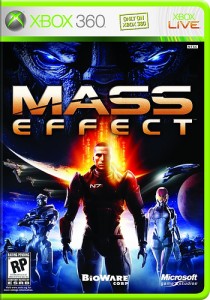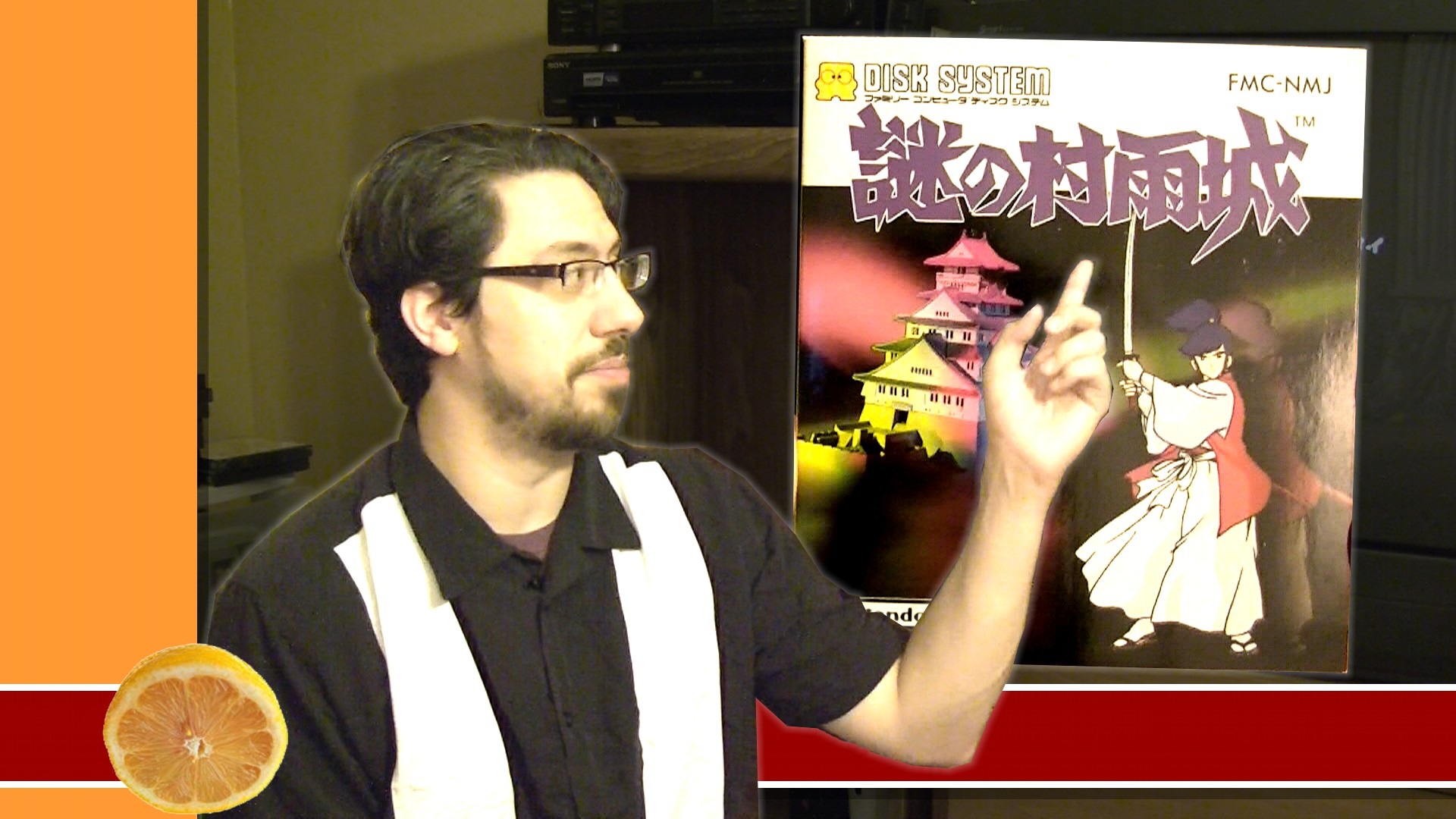$20 Game of the Week: Mass Effect (Xbox 360)
by William Talley, filed in $20 Game Of The Week, Games on Dec.19, 2008
 The division between American-style role-playing game fans and Japanese-style RPGers is almost as deep as the split between Mortal Kombat and Street Fighter fans. While American RPG games such as Diablo and the Elder Scrolls series have focused on more real-time action oriented combat and deep character customization, Japanese RPGs such as Final Fantasy and Dragon Quest have focused on character development, turn-based combat, and semi-linear storylines. For years, it has been a back and forth battle, with both American and Japanese RPGs gaining popularity amongst fans at certain periods. When Final Fantasy VII changed the face of the genre, many American gamers flocked over to the works of Square-Enix, and its contemporaries. Fast forward to a decade later. Japanese RPG developers have been going as strong as ever, and even new ones such as Mistwalker have emerged. However, the problem with the current JRPG scene is that these developers have mostly relied on the same old formulas that they have implemented since the late 90s. The failures of games such as The Last Remnant and Infinite Undiscovery (as well as the cult status of games such as Persona, The World Ends With You, and Valkyrie Profile) have demonstrated that the public wants to see something different. Moreover, throughout the last decade, the American RPG market has been bolstered by excellent games such as Diablo, Oblivion, Neverwinter Nights, and Jade Empire. This brings me to this week’s feature, Mass Effect. Mass Effect was created by BioWare, the camp behind hits such as Star Wars: Knights of the Old Republic, Jade Empire, Baldur’s Gate, and the forthcoming Dragon Age. As in the past, BioWare has taken the RPG genre to new heights by not sticking by the genre’s norms. Square-Enix, Tri-Ace, Mistwalker, and other RPG developers, both American and Japanese, would do well to study this game (especially if they plan on doing any more work with the Unreal 3 engine).
The division between American-style role-playing game fans and Japanese-style RPGers is almost as deep as the split between Mortal Kombat and Street Fighter fans. While American RPG games such as Diablo and the Elder Scrolls series have focused on more real-time action oriented combat and deep character customization, Japanese RPGs such as Final Fantasy and Dragon Quest have focused on character development, turn-based combat, and semi-linear storylines. For years, it has been a back and forth battle, with both American and Japanese RPGs gaining popularity amongst fans at certain periods. When Final Fantasy VII changed the face of the genre, many American gamers flocked over to the works of Square-Enix, and its contemporaries. Fast forward to a decade later. Japanese RPG developers have been going as strong as ever, and even new ones such as Mistwalker have emerged. However, the problem with the current JRPG scene is that these developers have mostly relied on the same old formulas that they have implemented since the late 90s. The failures of games such as The Last Remnant and Infinite Undiscovery (as well as the cult status of games such as Persona, The World Ends With You, and Valkyrie Profile) have demonstrated that the public wants to see something different. Moreover, throughout the last decade, the American RPG market has been bolstered by excellent games such as Diablo, Oblivion, Neverwinter Nights, and Jade Empire. This brings me to this week’s feature, Mass Effect. Mass Effect was created by BioWare, the camp behind hits such as Star Wars: Knights of the Old Republic, Jade Empire, Baldur’s Gate, and the forthcoming Dragon Age. As in the past, BioWare has taken the RPG genre to new heights by not sticking by the genre’s norms. Square-Enix, Tri-Ace, Mistwalker, and other RPG developers, both American and Japanese, would do well to study this game (especially if they plan on doing any more work with the Unreal 3 engine).
Mass Effect takes place far into the future. Mankind has long since mastered space travel, and has encountered other civilizations. A routine mission gone horribly wrong sets off a chain of events which will unravel a conspiracy centuries in the making. You’ll learn the secrets of alien civilizations both past and present, join an elite society of the galaxy’s upper hierarchy, and (hopefully) save the universe from a great threat. You’ll meet several characters, each with their own skills and personality, and you’ll travel across space to different solar systems as you act as the captain of your own ship.
If you’ve played other games from BioWare, then you already know what to expect from this game. Your character, Captain Shepard, is highly customizable. You change Shepard’s first name, looks, gender, and background. In fact, the only thing you can’t change about Shepard is his/her last name. You have a few basic classes to select from, but as you earn experience points, you can distribute skill points to your hero in any way you wish. This goes for any party members as well. Also, there is a heavy moral component. You can either choose to be a saint or a jerk depending on your actions and words. If you played KOTOR or Jade Empire, then you know how much the replay value extends when you can go back through the game and play the other side of the spectrum. If you want to, you can even play somewhere in between. Conversations are also done differently. When presented with a choice, you basically choose how your character will respond instead of their exact words. This makes conversations flow dynamically, and feel more organic. Since your character is even speaking during these conversations, your character has even more of a personality than the silent protagonist types seen in most RPGs.
Combat is done in real time, as you have an array of guns, grenades, skills, and Biotics. Biotics serve as the game’s magic, and the selection is pretty similar to the Force Powers in KOTOR. You can heal teammates, power up your weapons, push back enemies, or lock them in stasis fields. The combat makes use of a cover system not unlike Gears of War, and using it is vital to your survival. When not in the field, you can explore between planets. In fact, you gain special items and bonuses for discovering planets containing natural resources. Along with the main story, there are several side missions to take. Many of these side quests can be learned in elevator rides. The elevator rides are cleverly disguised loading screens, as you’ll learn valuable tidbits about the game’s world through side conversations and radio news reports. BioWare has created a universe that’s as compelling as Star Trek and Star Wars. The beautiful visuals, powered by the Unreal Engine 3, enhance the atmosphere, and there is a lot to discover. For 400 MS points, you can download the ‘Bring Down the Sky’ expansion, which adds some new content to the game.
Mass Effect is another classic from BioWare. RPG fans will want to add this to their collection, and even those not into RPGs will want to check this out. This sets a new standard for character development and storytelling in video gaming. Hopefully we will be hearing news of a sequel soon, as there is so much more to see from the world of Mass Effect. However, BioWare is currently focused on its next hit, Dragon Age, which is slated to be released sometime next year. If what we’ve seen so far is any indication though, Dragon Age should tide us over nicely until we hear of a new Mass Effect.
Note: This game is also available on the PC, although it is $29.99. It contains all the Xbox 360 version’s features, and it also includes a revised inventory system and hacking minigame. There is also a limited collector’s edition of the first game. It contains an art book, codex, and a bonus dvd. If you can find it, it’s highly recommended.


 PS3
PS3
 Famicom Dojo
Famicom Dojo KEEP PLAYING
KEEP PLAYING KEEP PLAYING: Rewind
KEEP PLAYING: Rewind Powet Toys
Powet Toys Powetcast
Powetcast Hitchhiker's Guide POWETcast
Hitchhiker's Guide POWETcast














